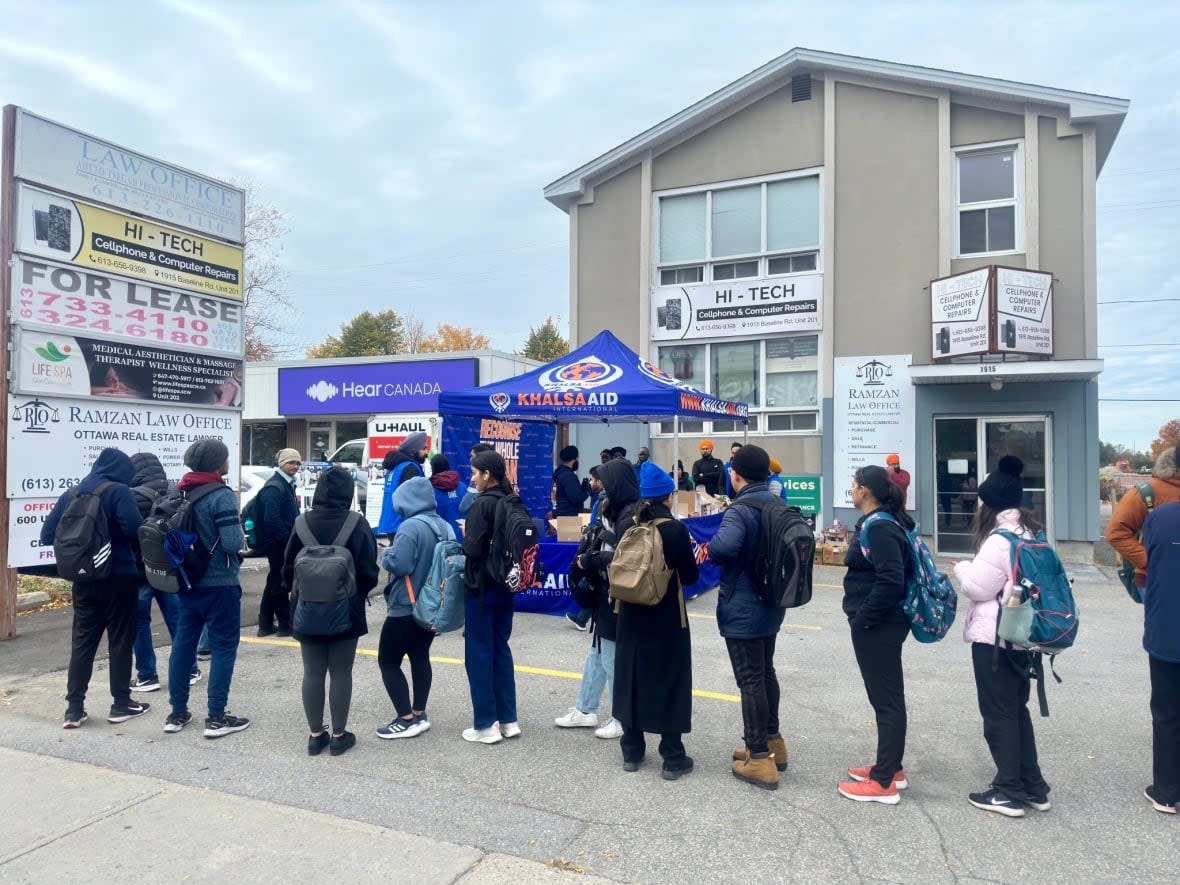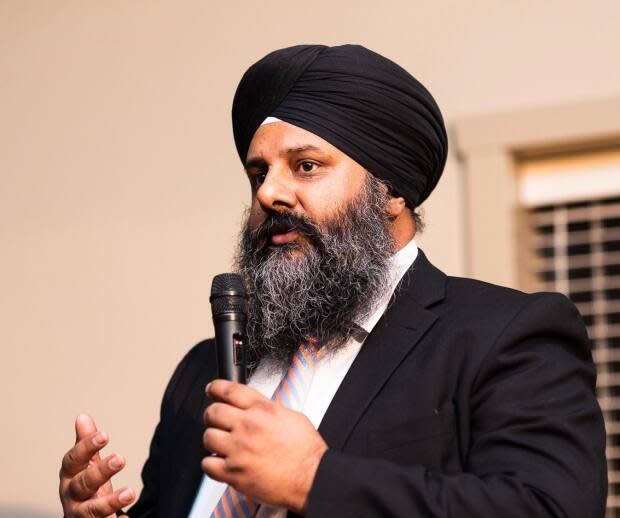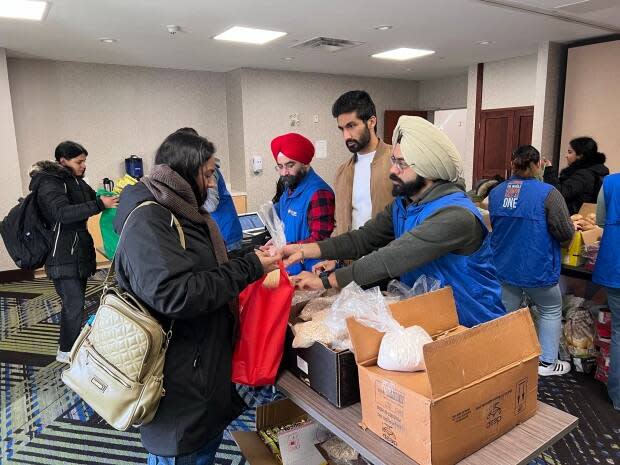International students are in 'crisis.' Governments need to take responsibility: Peel charities

This time last year, Khalsa Aid Canada says it was receiving five calls a week from international students in Brampton needing food, clothing and a place to live.
Now, amid worsening housing and affordability crises, it says it's receiving five calls a day — a figure well beyond what it can handle.
The international charity, the Canadian branch of which helps over 8,200 students struggling to access food, clothes, and shelter in cities nationwide, says the government and post-secondary institutions should be doing more to support international students in need.
With nearly 500,000 international students living in the Greater Toronto Area, Khalsa Aid's national director Jindi Singh says charities are under strain, taking on more than their fair share of the load.
"We truly feel it's not really our role," he said.
Post-secondary institutions are "making billions out of this situation," Singh said, but "there's absolutely no wrap-around services for these students, who are left to fend for themselves."
He says it's time for the post-secondary institutions and governments responsible for the situation to take ownership and get to the root of the problem.

Supporting international students is a complex undertaking, Singh says — one that involves navigating bad faith programs, fraudulent immigration agents, mental health issues and uncertainty about immigration policy and the permits needed to reside in the country.
The president of the College Student Alliance, Azi Afousi, agrees, adding that the lack of affordability makes the situation worse. Afousi says student unions across Ontario have reported fielding more calls about housing struggles, while one of her own colleagues shares a house with 15 other people.
"Housing in the GTA is like the wild, wild west," Afousi said.
International students' ability to make ends meet is also impacted by federal limitations on how much income can be earned, which, Singh says, further limits their job opportunities. Recent changes to the International Student Program, including a cap on study permits, have only added to the uncertainty.
"Your housing is affected, food is affected, mental health," Afousi said. "With students it's even more drastic because your academic output is affected."
With no housing or jobs, Singh said, "It's a homeless camp situation."
He says the situation is acute in Brampton, a city with 35 federally licensed colleges that attract tens of thousands of international students annually. Since last June, Khalsa Aid has delivered over 5,000 grocery bags full of non-perishable food to international students.
'Chronic underfunding' to blame: student advocate
International students pay four times more tuition than domestic students. For colleges and governments to not provide wrap-around services like housing, food and job referrals, is a "pure money grab," Singh said.
Afousi says the problem is exacerbated by Ontario's "chronic underfunding" of post-secondary education.
International students make up 68 per cent of tuition revenue at 24 Ontario colleges, and over 90 per cent at some Northern Ontario colleges, according to a 2021 provincial auditor general report.

International students from India alone contributed $2 billion to Ontario's post-secondary institutions' operating income last year, compared to roughly $1.8 billion the provincial government contributed, according to a September 2023 report by consulting firm Higher Education Strategy Associates.
A spokesperson for the Ontario Ministry of Colleges and Universities did not respond to questions about whether the province would increase its funding. Instead, the spokesperson pointed to a January news release which said the province is looking into requiring all colleges and universities to have guaranteed housing options for incoming international students.
While Mattoo and Singh both say they welcome the cap on permits, they want the government to put in place more support for international students currently in Canada who are having a hard time.
Singh says he blames the federal government for bringing in record-high numbers of international students — 800,000 in 2022, then 900,000 in 2023 — without making sure there was adequate housing.
"Who dropped the ball?"
WATCH | Trudeau says Ottawa 'pausing' international student admissions to ensure they 'get the right experience':
International students "are not responsible for the shortage of housing," said Julie Lafortune, spokesperson for Immigration, Refugees and Citizenship Canada (IRCC) in a statement to CBC Toronto.
Lafortune said, "It is clear that the number of students arriving in Canada has become unsustainable."
In December, Immigration Minister Marc Miller announced an increase to the cost-of-living financial requirement for study permit applicants from $10,000 to $20,635. Lafortune said that amount will now be adjusted each year so that international students have "enough money to support themselves."
"A student who arrives without adequate funds is more vulnerable to being exploited by an employer or might feel forced to accept a poor housing situation," she said.
In Brampton, charity sees 'unprecedented' level of struggle
While the federal government suggested its new cap on study permits will help ease the housing crunch, organizations including Khalsa Aid, the World Sikh Organization, the College Students Association and Sukhmani Haven say the cap doesn't do anything to help those already here.
"We're seeing unprecedented levels of people struggling," Sukhmani Haven board member Deepa Mattoo told CBC Toronto.

More than one dozen volunteers run Sukhmani Haven, a Mississauga-based organization that rents a duplex home in Brampton to house eight international students for free — a feat that took months of applying to rent 50 different houses and receiving dozens of rejections before eventually signing a lease.
"It is really complicated right now," said Mattoo, who is also a lawyer at Barbra Schlifer Commemorative Clinic
"There's not a lot of renting spaces available or they're available at such a high price that basically you get priced out."
The IRCC says non-profit organizations are eligible to apply for the Affordable Housing Fund to construct, maintain, and repair affordable housing and shelter spaces.
"We need all levels of government at the table with us on this," Lafortune said.
Sukhmani Haven hosted a fundraiser dinner in 2022, which has allowed the charity to house 34 students on a short and long term basis, in addition to providing some with financial aid, tuition bursaries, pro bono legal services and support via a crisis hotline.
But the organization says it's concerned about its ability to keep up, which worries those for whom it's a lifeline.
Sheridan College business student Simranpreet Kaur moved into the organization's Brampton rental two months ago following a months-long search for housing that left the international student from India feeling "so depressed."
Sukhmani Haven introduced Kaur to other students with similar experiences, which she says helped her feel less alone.
"It helped me a lot because I can easily share my feelings with everyone," she said.

